|
At the start of 1899 the became a limited company, Orme, Evans & Co.
Ltd., with a capital of £50,000. The first directors are given as
Alfred Orme of Tettenhall Road; H. Bean Hall of Tettenhall Road; F. T.
Langley, of Oakfield, Wolverhampton; Samuel Glaze, of Waterloo Road;
Herbert Alfred Orme of Tettenhall Road; and Victor Dubois, of Penn Road.
At about this time many companies were taking advantage of the benefits
of incorporation.
In an article in The Wolverhampton Exhibition Pictorial of
1902, the reporter, who had interviewed Alfred Orme, writes of
the firm's history: "At first purely japanned goods were
manufactured, a speciality being made of tea-trays, a "line"
which has been more hit than anything else. Then tin-plate
working received its proper share of attention, and when the
trade declined - as it is notorious it has everywhere - the
firm, ever on the alert, took up the manufacture of enamelled
hollow-ware, putting down an extensive plant to produce it.
They have had their reward, having been extremely successful -
more so in fact than any other English firm. The company
this year took over the Phoenix works". The Phoenix works were
those of Henry Fearncombe & Co., the famous japanners.
This is a typical story - many firms of japanners had to find
other work when japanning went into decline in the second half
of the nineteenth century. Tin plate wares were an obvious
recourse but many of them took to making brass and copperware,
which seems to have had a resurgence in popularity as japanning
declined. Orme Evans certainly produced brass and
copperwares (as had Henry Fearncombe) but, to judge by the
evidence available, they were not great producers of this and
certainly not on the scale of Sankeys, Beldray or even
Loveridge.
The WSSI article of 1899 article refers to the Elgin Works as
occupying "an extensive area on which are erected several ranges
of buildings from one to three stories".
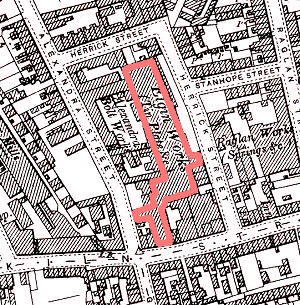 |
The 1902 edition of the Ordnance Survey map shows
"Elgin Works (Tin Plate &c)" bounded by Brickkiln Street,
Herrick Street and Alexandra Street.
The red lined (added to the map) shows the land within a
single boundary, which certainly represents an accumulation of
sites. Orme Evans may well have owned accumulated other
buildings shown near by. |
| When they took over Henry Fearncombe in 1902 they
would have acquired Phoenix Works, which lay between Dudley Road
and what is now the Birmingham New Road, just north of All
Saints Road. It is not known whether they retained and
used these works but in 1924 they were still displaying Fearncombe's trade mark on their letterhead (right). |
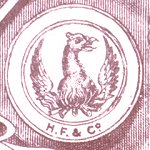 |
The WSSI article of 1899 article says that their products
include "all kinds of enamelled holloware, and enamelled
advertising plates, besides a large number of specialities in
sheet iron, steel, tinplate, brass and copper, and art
manufactures".
The enamelled holloware includes "Anglican" enamellled are
"comprising culinary and table furnishing utensils and household
requisites. There is also "Windsor" ware comprising "very pretty
designs" in "dinner, breakfast, tea and toilet services, gold rimmed and
lined, equal in appearance to best china". There are also
"Parisian" and "General" toilet services, all of white enamel. One
assumes that a toilet service is a set consisting of a bowl, water jug
and slop bucket, which would normally be sold on a stand. They also make
"sanitary enamelled wrought iron sinks".
Also listed is "a very large and varied assortment of enamelled iron
signs, advertising tablets, tradesmen's swinging signs, etc."
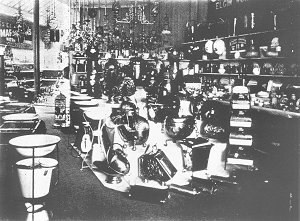 |
This rather murky photo from
the same source shows "A Corner of the London Showroom".
No address is given.
Note the toilet sets to the right and
the brass coal boxes and scuttles in the centre. There are
no smaller copper and brassware items discernible. There
seem to be a lot of brass lighting fittings hanging up, top
centre. |
"In the tinplate-working department is produced the whole series of
culinary articles and kitchen requisites ... including kettles,
saucepans, dish covers and many other articles ...". There is also
reference to the "household self-basting enamelled steel pan"
which is "so well known that it requires only passing allusion".
Then there is the "patent breakfast tray" which has an space within it
in which "food or sauces that are required to be kept very hot may be
placed". There is also an "afternoon-tea fire-tray" which will
keep a kettle boiling and tea and coffee hot without boiling and which
has a white enamelled pan in which cakes of biscuits may be heated
through. These are both said to be made "under the Stormont-Murphy
patents" which seems to depend on some form of solid fuel block which
you set fire to and place inside the tray. That anyway is how the
"Klondyke and African" cooker, made in aluminium, seems to work, as does
the coachbox and carriage heater.
| The article then refers to something almost
entirely different, the "Carter patent gear case for cycles,
which was introduced to the public notice at the Stanley Show
about ten years ago [sc. about 1889]". Orme Evans were
said to have a special department for working the patent which
had great success and "many thousands of Carter gear cases have
been supplied to riders of every class and every nationality in
the world" - which may just be a slight exaggeration. (The
advert, right, comes from 1896). |
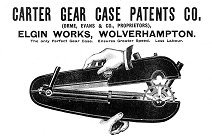 |
"Wolverhampton and South Staffordshire
Illustrated" was an advertising medium posing as a business
review and the basis of the copy seems to have been provided by
the firms reviewed and written up, in flowery praise, by the
publishers. Orme Evans is one of only two cases noted in
this publication as mentioning a design department: "A
numerous staff of designers and decorators are constantly at
work in getting out new patterns and in the production of the
various goods, many of which are beautifully decorated with
artistic taste and finish, this being especially noteworthy in
the case of japanned goods and in the chasing and repousse
decoration of coal vases and scoops, jardiniere vases, tea
trays, waiters, etc..".
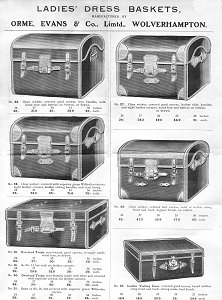 |
The single sheet
flyer, shown left, must be 1899 or later as it has "Ltd" in
the title. But it shows another string to Orme Evans, bow at
about this time. The trunks seem to have been
steel framed boxes covered with canvas. Trunks had
become an important commodity in late Victorian times with a
great increase in travel by rail and by boat to colonial
parts. |
 |
|
 |
Return to the
previous page |
|
Proceed to
later history |
|